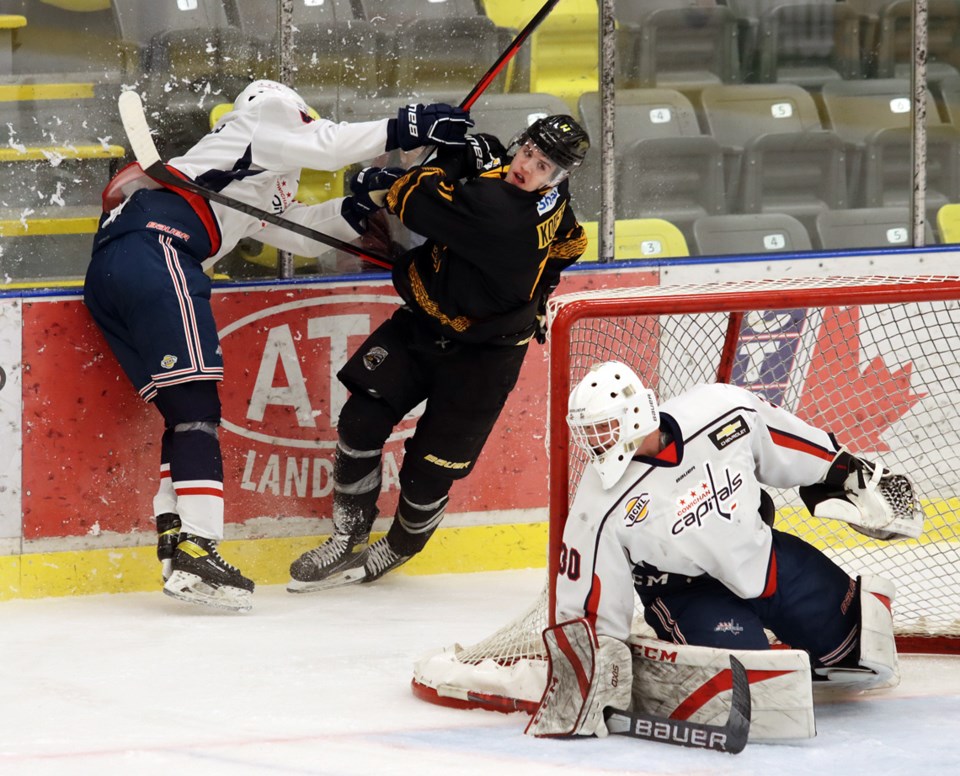This should have been a week of celebration for the BC Hockey League (BCHL).
But instead of welcoming the Junior 'A' circuit’s best players to Penticton for its 60th anniversary All-Star festivities including a three-on-three tournament played on an outdoor rink and a prospect's game to showcase its stars to scouts, the resurgent COVID-19 pandemic has put the event on ice until 2023.
It’s the latest blow in almost two years of successive setbacks for the BCHL and its 18 teams brought on by the global pandemic and then catastrophic flooding and road damage from a series of storms last November that essentially cut the league in two.
Still, commissioner Chris Hebb is confident the group will emerge from the adversity stronger and more cohesive than ever.
“The league has been around for 60 years and it’s created a great reputation,” he said. “We don’t have a lot of complaining.”
Not that there’s been any shortage of concerns.
The onset of the COVID-19 public health emergency in March 2020, came just as the BCHL playoffs were entering their second round. The league, like virtually every sports organization around the globe, shut down, hoping the contagion would only present a temporary blip.
It wasn’t.
The subsequent cancellation of the post-season deprived the league and its owners of an important revenue source.
Bank accounts were depleted even further when the 2020–21 season started with a schedule of exhibition games played in empty arenas until that was shut down after just five weeks by the onset of the pandemic’s second wave.
When the league was able to reconvene a season last spring, it had to gather most of its Canadian teams (the U.S.-based Wenatchee Wild was forced to suspend play because of border closures, and the Langley Rivermen opted out) in five regional pods across the province for games against geographical rivals, again in empty arenas and with no championship to refill the coffers and fuel fan excitement.
“It’s been tough,” Hebb said. “We’ve depleted our rainy day fund.”
While the 2021-22 season started with capacity restrictions, they were quickly eased and the BCHL seemed back on the road to a more normal campaign. Until some of the key roads teams use to get around the province were damaged and closed by last November’s record-setting rainstorms.
Some games were cancelled or postponed. The Coquitlam Express spent two days stranded in Kamloops when the team couldn’t continue its journey home from a road trip that included stops in Merritt and Prince George.
Again, the league adjusted, reconfiguring its schedule to reduce travel around the province by eliminating inter-conference games.
Now, it’s the highly contagious Omicron variant of the COVID-19 virus that’s wreaking havoc.
Several teams have reported exposures, scuttling games and practices. Attendance at arenas has been capped at 50 per cent capacity until at least the end of January.
With the number of games to be fit back into the schedule, Hebb is unsure whether the season can be fully realized by March 20, its scheduled conclusion. As a result, the final standings will be determined by the winning percentage of each team.
Still, Hebb said, “If we can play games, we will,” adding any decisions will be based upon the best safety practices for players, staff and fans.
Through it all, the commissioner, who started his tenure in 2018 by visiting each franchise, has had to juggle all the league’s myriad moving parts and disparate owners through online meetings.
“The toughest part is you don’t get to look the guy in the eye and have a conversation,” Hebb said. “There is a challenge when you don’t get to have face-to-face meetings.”
So far, though, he said there’s been unwavering support from owners for the league’s primary mission to continue to the development of young hockey players with an eye to getting them post-secondary opportunities, no matter the hurdles and expense involved.
“There hasn’t been any panic,” Hebb said. “People are proud to be a part of the league and they’re also proud to see these kids have a great experience and get scholarships to college.”
The postponement of the all-star festivities and a complementary Road Show event in late February that would have seen the Prince George Spruce Kings and Salmon Arm Silverbacks play a pair of games in Burns Lake in partnership with the Lake Babine First Nation has been a bit of a blow, though.
Hebb said the league has identified special events as a way to solidify its business and take competition to the next level.
“It is our belief that sponsors and fans want events,” he said, pointing to the enduring popularity of the World Junior tournament. “These events have the opportunity to set the league apart.”
Coquitlam Express make moves to bolster their roster https://t.co/fZbBU1wzHy pic.twitter.com/by530ESA8w
— Tri-City News (@TriCityNews) January 11, 2022





